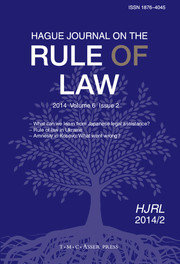Article contents
The Deaf, the Blind and the Politician: The Troubles of Justice and Security Interventions in Fragile States1
Published online by Cambridge University Press: 26 March 2012
Abstract
This article argues for an integrated, political and pragmatic approach to justice and security development as one of the key objectives of effective international support to peace building and state building in conflict-affected and fragile states. Developments since the 1990s suggest that different actors and communities have started to work on the same issues from different angles and with – perceived – different mandates. As a result, important parts of the debate on how to deal with security system reform (SSR), justice reform and the rule of law seem somewhat stuck in conceptual arguments. This article suggests moving away from such debates and instead to focus on what such justice and security engagements are meant to achieve, for whom, and which general approaches are likely to provide most added value. It argues that results require political focus, long-term processes and need to be in tune with local elite interests – whilst pursuing the aim of gradually helping to improve delivery of justice and security as basic services for all, to appropriate local standards. External and domestic objectives require careful balancing, creative compromises and strong incentives. The article also outlines a number of recurrent challenges to effective programming and suggests some ideas for improvement to achieve better results and more value for money.
Keywords
- Type
- Articles
- Information
- Hague Journal on the Rule of Law , Volume 4 , Special Issue 1: Special Issue on Security Sector Reform and Rule of Law , March 2012 , pp. 76 - 97
- Copyright
- Copyright © T.M.C. Asser Press and the Authors 2012
References
1 The article does not represent the official views of either institution.
- 1
- Cited by


